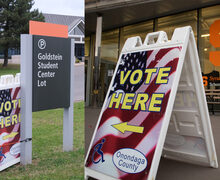Marijuana should be fully legalized in New York
Sarah Allam | Illustration Editor
The real question at hand here is whether marijuana use should even be a crime in the first place.
On Aug. 28, New York enacted legislation decriminalizing the possession of marijuana. The new laws expand the state’s initial decriminalization of the substance, which took effect more than forty years ago.
While the legislation has been deemed long overdue by its advocates, it stops short of complete legalization — an essential step to ensuring that victimless offenses are no longer seen as punishable in the eyes of the law.
Legislation decriminalizing marijuana was first introduced in New York in 1977. Possession of 25 grams of marijuana or less would get you a $100 fine, but public possession of marijuana remained a misdemeanor that could get you arrested.

Eva Suppa | Digital Design Editor
The legislation makes the possession of less than two ounces of marijuana a violation rather than a crime, and lowers the fine for possession from $100 to $50. Gov. Andrew Cuomo, who was instrumental in getting the legislation passed, said in an official statement that the measures mark the “start of a new chapter in the criminal justice system.”
But the new legislation just makes simple numerical tweaks to pre-existing measures, softening the blow of the punishments rather than fundamentally altering the law.
“Even with the changes to criminal law, because violations continue to be arrestable offenses, police officers can still detain people, and district attorneys can still prosecute people for marijuana offenses,” said Erin George, the Civil Rights Campaigns director at Citizen Action of New York.
The biggest change the new legislation makes is automatically expunging past convictions for marijuana possession of 25 grams or less, but even this tampers with old statutes more than it initiates new ones.
“It expunges records for past low-level marijuana convictions — but exactly how that process will work is not totally clear yet,” George said.
What the recent minimal changes ignore is the need for structural reform on the issue of marijuana. Cutting the possession penalty in half and upping the number of ounces allowed before it can be considered a crime speaks nothing to the fundamental issues of racial disparity among marijuana arrests, and the fact that so-called marijuana ‘crimes’ are victimless to begin with.
“Marijuana decriminalization in New York State has historically failed to address the racist ‘War on Drugs,” George said.
“In the last 20 years alone, more than 900,000 New Yorkers have been arrested for marijuana possession and 80% of all marijuana arrests statewide were targeted at Black and Latinx New Yorkers — despite the fact that white people use marijuana at similar rates,” George said. “The decriminalization bill signed into law this year also falls short of what is needed.”
Data from the American Civil Liberties Union show that, although white people and black people use marijuana at similar rates, black Americans are almost four times as likely to be arrested.

Eva Suppa | Digital Design Editor
That disparity remains true in New York — just in the city of Syracuse, from 2017 to 2018, 2,637 men were arrested for marijuana use, nearly 80% of whom were black. While Cuomo’s new measures ease punishments across the board, they do nothing to address significant racial disparities in marijuana arrests, which will continue even when the penalties are $50 instead of $100.
The real question at hand here is whether marijuana use should even be a crime in the first place. Its status as a crime implies that there should be a victim. This, however, is not the case with marijuana use — it is a substance that individuals personally use, and, while it is accompanied by some health risks, its consumption doesn’t pose a threat.
New York should commit to a full legalization of marijuana, as so many other states have, in the interest of expanding individual freedom in a country that so prides itself on liberty. Criminalizing what someone can and cannot do with their own body is not freedom — it is suppression, and it is a suppression that has adversely affected less privileged members of society.
It is noble that Governor Cuomo did something to try to expand marijuana’s decriminalization in New York, but its impacts are far too minimal, and its introduction far too late. The time is long overdue to stop the costly, racist and oppressive war against recreational marijuana use.
Nicholas Cassol is a freshman newspaper and online journalism major. His column appears bi-weekly. He can be reached at nrcassol@syr.edu. He can be followed on Twitter at @CassolNick.
LEARN MORE:
- Experts say New York’s marijuana decriminalization “falls short”
- Conservative column | Marijuana decriminalization in New York downplays risks of weed
Published on September 19, 2019 at 3:24 am





